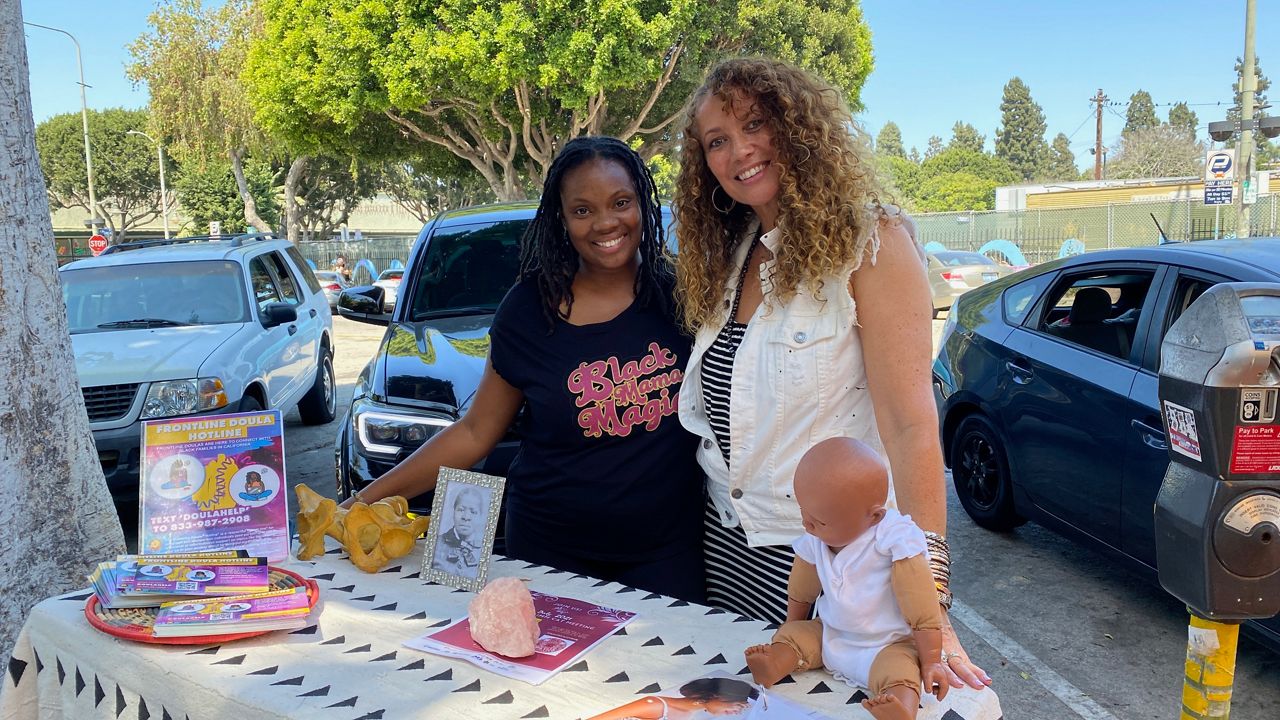LOS ANGELES — Donuts, discussions, documentaries and yoni herbs — the Frontline Doula program is tackling as many angles as possible this week to ensure that childbearing Black people have as much information and support as possible as they head toward parenthood.
“When I say ‘birthing community,’ I’m also thinking about the home, the birthing family — it’s really not just the person having the baby,” said Dr. Sayida Peprah, co-founder of Frontline Doulas, but about everyone: mother, father, aunts, grandmas, anyone involved in supporting the birth. “We want the whole community to think about who is birthing these babies because otherwise, there’s too much pressure on the mama.”
This week, Frontline Doulas partnered with Leimert Park business stalwart Sole Folks — a boutique and Black community incubator — on a series of events called “Heal the Womb, Heal the World.” The series kicked off Wednesday with a food giveaway and a Zoom discussion on reproductive wellness and continues this weekend.
Pregnancy can be a bumpy journey, especially for Black childbearing people. Frontline Doulas are looking to fill a void in prenatal and perinatal care by helping Black mothers and families along their journey.
“We are this collective of community, working in the community,” Peprah said.
Black women are three times more likely to die from pregnancy-related causes than white women, according to the Centers for Disease Control.
“Multiple factors contribute to these disparities, such as variation in quality health care, underlying chronic conditions, structural racism and implicit bias,” according to a CDC data sheet.
Doulas are birthing experts; having them available throughout the pregnancy affords a family maternal education, as well as social and emotional support.
“And it’s ideal if that person is of the same culture as you and is hopefully competent to provide those services because then she’d be seen and heard and understood,” said Khefri Riley, Frontline Doulas' other co-director. “There’s no need to translate that to the racist medical industrial complex — she’s giving specific care to the birthing family,” from someone who looks like the family.
Earlier this year, Frontline Doulas connected with Sole Folks founder Akil West to put together this series for the community, focusing on support for pregnant women, but also to offer support for fathers and to raise awareness of pregnancy and forced sterilization of women in prison.
The sessions this weekend will each have a hand in those subjects.
On Saturday, Donuts With Dads — a virtual group that offers peer-to-peer support for BIPOC (Black, Indigenous and People of Color) fathers but is inclusive to all — will meet to discuss fatherhood and toxic masculinity in the 21st century.
The conversations are free-flowing, said DWD creator Bobby Brown, and take a “simple, vulnerable approach” that gets fathers talking about success and failures, hopes and fears, with the goal of helping to develop the skills for a new generation of men to support their families in the best ways possible.
“I think there’s a hugely reflective generation that has empathy for our history and for the things that hurt us in the past,” Brown said. “We choose to give empathy and love and compassion, as opposed to letting the hurt fuel us.”
Sunday is the big day with events lined up from noon to 4 p.m., including an information table with Black doulas from around LA County, a yoni herbs “playshop” — featuring natural medicines to boost the female reproductive system — and a screening of “Belly of the Beast,” a documentary exploring forced sterilization in prisons.
Sunday will also include a community altar to honor “the Divine Womb” — a celebration of femininity and life.
“We want to honor those who have birthed us — those who came before us — those we are birthing, and those who are birthing now,” Riley said. “The main theme is healing and transformation…it’s similar to when you see memorials for those who have passed. We want to not only honor those who have passed, but to honor the living and the life force.”
For more information on Frontline Doulas' “Heal the Womb, Heal the World” series, visit frontlinedoulas.com/healthewomb.com.



